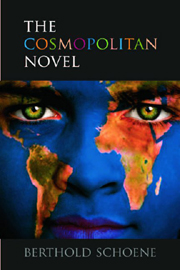2 - James Kelman's Cosmopolitan Jeremiads
from I - IMAGINING COSMOPOLITICS
Published online by Cambridge University Press: 12 September 2012
Summary
No other British writer's shift from locally specific concerns to global themes is as symptomatic of globalisation's steadily increasing encroachment on ordinary life as James Kelman's. Like McEwan's novels, both Translated Accounts (2001) and You Have to Be Careful in the Land of the Free (2004) convey a new global sense of British contemporaneity, yet the contrast between England's and Scotland's premier authors could scarcely be more pronounced.
In Kelman's novels anonymous state apparatuses have eradicated familial comfort zones. Most characteristically, his fictions feature loners estranged and physically removed from their families. Pre-dating 9/11, Translated Accounts catalogues a plethora of tales about the threat of totalitarianism to individual and communal world-creation right down to the linguistic basics of human relations. The novel interrogates western optimism at the close of the Cold War, notably interpreted by some at the time as potentially ending all historical strife. Echoing Appadurai's recent reassessment of the 1990s as ‘a decade of superviolence’ (2006: 1), Kelman's novel alerts us to the contemporaneity of genocidal cataclysms, such as those that ravaged Yugoslavia and Rwanda, unconscionably eclipsed by politically naive or disingenuous celebrations of the post-Cold War era as a putative ‘holiday from history’ (see Will 2001). Depicting the experiences of Scotsman Jeremiah Brown in US America, You Have to Be Careful picks up on its predecessor's theme of global totalitarianism by casting contemporary US America in the role of both humanity's number-one utopia and its most acutely dystopian cosmopolis.
- Type
- Chapter
- Information
- The Cosmopolitan Novel , pp. 66 - 94Publisher: Edinburgh University PressPrint publication year: 2009



